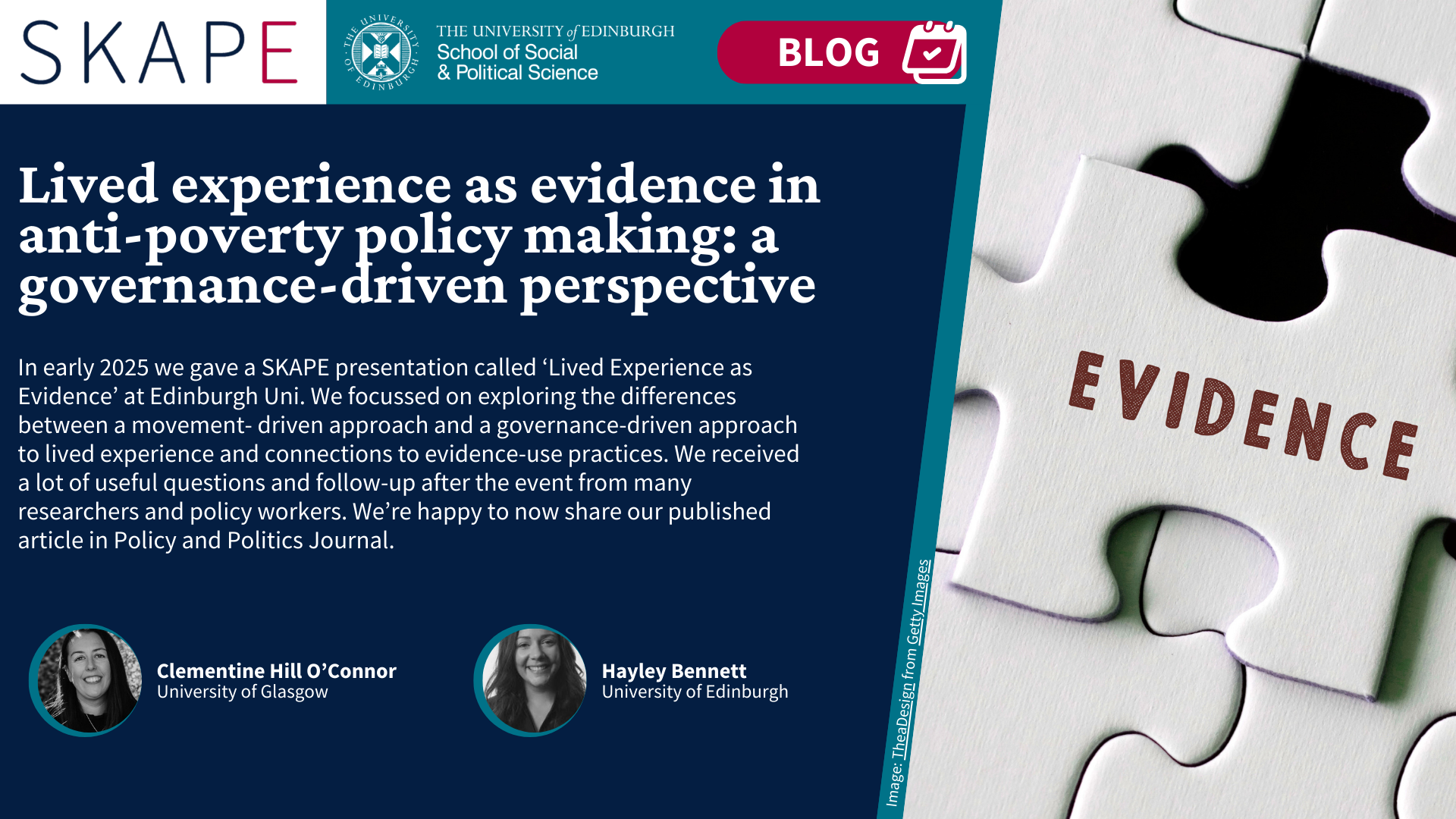Lived experience as evidence in anti-poverty policy making: a governance-driven perspective

By Clementine O’Connor and Hayley Bennett
In early 2025 we gave a SKAPE presentation called ‘Lived Experience as Evidence’ at Edinburgh Uni. We focussed on exploring the differences between a movement-driven approach and a governance-driven approach to lived experience and connections to evidence-use practices. We developed this idea through a consideration of Scottish anti-poverty making and focussed on People’s Panel for Wellbeing, the Social Security Experience Panels, and the Social Renewal Advisory Board. We received a lot of useful questions and follow-up after the event from many researchers and policy workers. We’re happy to now share our published article in Policy and Politics Journal (Open Access).
Why would we write about lived experience as evidence?
We started writing this paper after numerous conversations about our experiences and research in a broad anti-poverty policy space in Scotland. Like many other academics, researchers, policy workers, campaigners and more, we’d seen not only a rise of the use of the term ‘Lived Experience’, but also various understandings of this idea and what it might mean and how it was being mobilised as a form of information or knowledge that could — and often advocates argue should — be used in policymaking. Our examination of Scopus (academic journal abstract and citation database) demonstrates that, across all disciplines and journals, there were only 15 articles using the term in 1990, and by 2023 there were 5,954 articles using this term. The more we talked, read, researched, and shared our different experiences from policy and practice spaces, the more we felt that the term was being used, conceptualised, and operationalised in numerous diverse and sometimes competing ways [1]. Did it describe a type of knowledge? Was it about a practice through which knowledge was created? Is it a process or an output? Does it mean the same in policy contexts as in research ones? These conversations continued and expanded to include other academics and practitioners, and eventually we started (many years ago!) to put ideas down on paper and to work through more succinctly what it is we wanted to offer to this burgeoning aspect of social policy. There are lots of aspects that could be discussed and examined (especially around ethics, anonymity, etc [2]) but we chose a specific focus based on some of our own areas of expertise and interests.
We knew we wanted to offer some conceptual clarity, critical reflection, and perhaps ‘something useful’, and felt a need to draw on participatory governance literature to consider the different drivers of the move towards the use of lived experience in policymaking, as well as to offer terminology to make sense of different approaches to generating and using lived experience in policymaking. In the article we ask:
1. How is the process through which lived experience is being sought or understood by those driving the process?
2. Through what means does lived experience enter the policy-making space?
We find that, although lived experience is often assumed to be democracy-driven and a campaigning movement that challenges traditional forms of expertise and power, it can also be driven by state-led processes and thus could be considered an example of governance-driven democratisation. We explore the use of lived experience in the context of Scottish anti-poverty policy making and show that, while the language of participation and deliberation feature in the rationale, these ideas can be squeezed out as institutional needs and norms take precedent. We argue that this illustrates the ways that policy ‘elites’ are required to design processes that serve specific policy needs and that these needs are often related to producing and using specific forms of evidence. In this way, this research makes an important contribution to existing literatures on ‘evidence-use’ and participatory governance that consider how types of evidence are perceived and utilised in policymaking processes.
Why this work matters?
For us, there are three reasons why our work matters.
1. There are perhaps unfounded assumptions that all activities and outputs termed ‘lived experience’ hold shared values around power-disruption and seldom heard voices. But this isn’t always the case. In fact, ‘lived experience’ can take many forms, produced in a variety of ways with varying and sometimes competing sets of values and approaches to ethics.
2. We aren’t saying that governance-driven lived experience is necessarily ‘wrong’ and that governments should stop using participatory models in policymaking processes. But it is important that there is appropriate language available to describe and evaluate different approaches, practices and uses — especially as ‘lived experience’ may be a term prone to policy capture and without definitional consensus.
3. We see this work as contributing to various existing and emerging overlapping conversations. It is important that there is space for such critical reflection on practices and processes of knowledge production — a fundamental component of academic and scientific research. This doesn’t mean we (or others that reflect critically) are inherently ‘anti lived experience’ or advocating for exclusionary systems of policymaking and knowledge production. In fact, it is the opposite. Without critical reflection and conceptual developments to improve practices and clarify processes, values, ethics, and approaches, the term ‘lived experience’ is open to more hostile critiques over ethics, rigour and reliability.
There are a lot of people working in this space (especially in Scotland) and we hope our work contributes to these critical conversations on the purpose of lived experience and especially how lived experience approaches interact with both research and policymaking practices. Please get in touch if you want to discuss more.
[1] Hayley has a discussion paper on participatory instruments/lived experience models and qualitative and participatory research, click here for more details.
Clemmie is currently examining the use of lived experience in Scottish Parliamentary processes, click here for more details.
[2] For example, there is an excellent series on BBC Sounds by Darren McGarvey called ‘Trauma Industrial Complex’. Episode 2 includes numerous critical reflections on the production and use of lived experience in policymaking and service design.